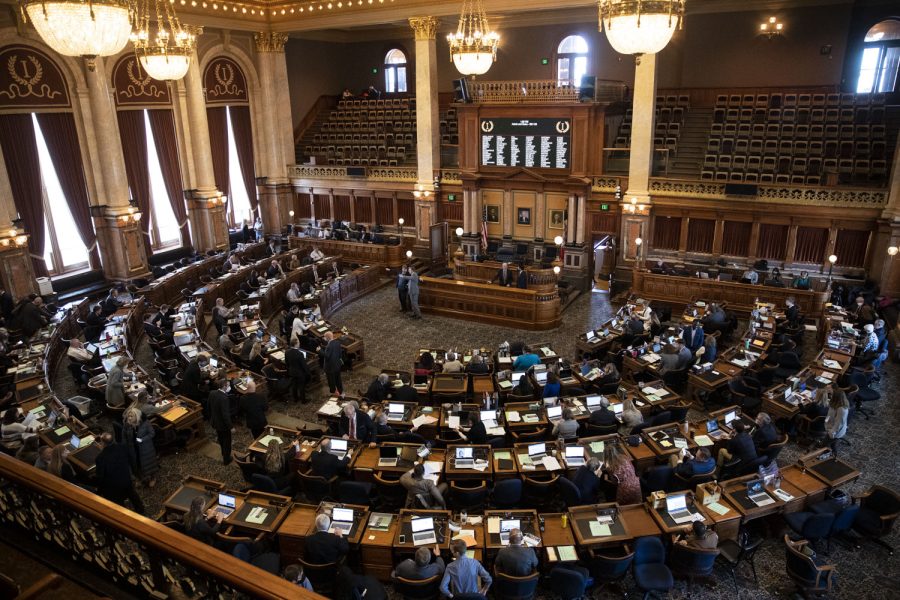New Iowa legislation could harm funding to the state’s water sensor network
Legislation approved by the Iowa Legislature could cut funding to water sensors across the state.
Members of the House congregate in the House Chamber after the opening of the 2022 Legislative Session at the Iowa State Capitol in Des Moines, Iowa, on Monday, Jan. 10, 2022. Both the House and Senate Republican leaders said the priority of this session is to return tax funds and address workforce conditions.
May 4, 2023
The Iowa Senate recently passed budget spending bills that could eliminate funding for river and stream sensors that measure nitrate and phosphorus, which could create potential risks to conservation practices.
The House Appropriations Committee passed four spending bills: Senate File 558, Senate File 557, House Study Bill 248, and Senate File 576. These bills determine upcoming budget limits and restrictions, and Senate File 558 refers explicitly to agricultural and natural resources.
SF 558 shifts $500,000 from Iowa State University’s Nutrient Research Center to the Iowa Department of Agriculture and Land Stewardship. ISU’s Nutrient Research Center supports the water sensor network developed by the University of Iowa and was planning on allocating $500,000 to the UI for the network and related projects this year.
Work between ISU, the UI, and the University of Northern Iowa relating to water sensor work has been brought into question with the new budget, which removed the requirement that ISU works with the UI and the UNI.
Director of Hydroscience and Engineering Larry Weber said if ISU’s Nutrient Research Center can’t continue to fund the network because of budget cuts, the UI will have to explore different funding options.
“It is my work and goal to keep the network up and running,” Weber said. “We don’t have a clear answer yet in terms of how we’ll keep it funded for next year, so we’re working through that.”
RELATED: UI increases national reach with new Center for Hydrologic Development
The budget for agriculture and natural resources passed in the Iowa Senate on April 25 with a vote of 33 to 16. On May 2, the bill was passed in the Iowa House 62 to 33.
When the bill reached the House floor, Rep. Elinor Levin, D-Iowa City, said she would not support the bill because it ignores current problems in Iowa waterways. Levin serves on the House’s Agriculture and Natural Resources Committee and represents District 89, which encompasses a majority of Iowa City.
“This budget ignores the continued problems faced by our public waterways. Those problems are diverse, and they are not easily addressed,” Levin said during House discussion.
Levin continued by saying that Iowans deserve a water system that allows access to clean drinking water.
Iowa utilizes nearly 70 sensors on water bodies such as streams and rivers to measure nitrate concentrations. The data from these sensors helps the state reform water treatment plants and foster improvements that work to reduce pollution.
Data from these sensors can be viewed and interacted with in real-time on the Iowa Water Quality Information System website.
Budget cuts to the water sensor network were proposed as early as 2017. In 2017, Republican lawmakers proposed a budget that would have cut state funding to the Iowa Flood Center, which is housed at the UI and received funding from the Iowa Legislature in 2009 in response to the Eastern Iowa Flood of 2008.
Director of the Iowa Flood Center Witold Krajewski commended the Legislature for its funding following the 2008 flood when it was announced the center’s Hydraulics Laboratory would partner with the University of Alabama for a new Center for Hydrologic Development.















